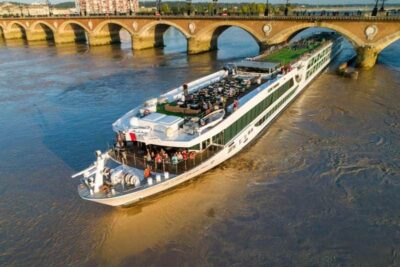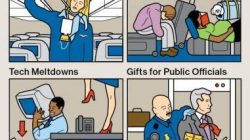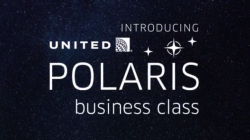It seems like the news outlets are bursting this week with griping.
Caution: before you continue reading, I must warn you, this post will be full of debbie-downerism. I advise anyone who can’t tolerate far-fetched, irrational boo-hooing to abstain from full exposure to such sources.
Let’s start with the most dishonorable mention of the day: business journal portfolio.com awarded United Airlines a repeat title of “Worst. Airline. Ever. Again,” roughly four years after a similar bash-fest in summer 2008, when Portfolio claimed United was the absolute, “worst of all” players in competing in the airline industry.
Citing the laundry list of woes that United has stirred up since merging with Continental two years ago, the Portfolio claimed that United is once again lagging behind all of its legacy competitors in most financial measures or service metrics. Most directly, the author pinned the source of this “downward spiral” on United CEO Jeff Smisek, claiming that he has “made himself the public face” of the United-Continental merger.
Among the top list of complaints the Portfolio cited included unhappy employees, in midst of their recent go-live with the contentious website, “The Unfriendly Skies” aimed at venting their frustrations at the slow pace of labor contract integration, as well as pissed-off elites, non-standardized in-flight product offerings (often leading to confusion when aircraft swaps occur), all the way down to system glitches post-March 3 cutover and drama in the C-suites.
Yes, the above stated reasons are annoying, but certainly not permanent changes. These are necessary pains which occur with any merger (industry or non-industry). The product offering will be varied for some time. The frequent flier program will have to undergo adjustments and the elites will not be happy with the changes. Irregular operational issues will occur until the system smooths itself out. Talent may choose to pursue itself elsewhere, but fresh thinkers will come in to replace it.
If you look at Delta Air Lines, the scenario wasn’t so different back when they were completing their merger with Northwest Airlines.
Still, some anger appears to be looming up in the Twin Cities, where the former Northwest Airlines was once based and apparently, has been “knocked down a few pegs” since the merger, according to its local customer base.
Yesterday, the Star Tribuneof Minneapolis/St. Paul published an article, “Minneapolis-St. Paul Airport on short end of Delta jet swap,” attacking Atlanta-based Delta for replacing the “roomy, comfortable Airbuses from the former Northwest Airlines with older, lower-end planes.”
One of the largest differences in the fleet types of pre-merger Delta and pre-merger Northwest were that they only shared 1 fleet type in common: the 757. Then Eagan, MN-based Northwest mostly operated Airbus aircraft on narrow-body routes and a few McDonnell-Douglas DC-9 jets, whereas Delta’s fleet was primarily Boeing aircraft, including the McDonnell Douglass MD-90 and MD-88.
After the merger, the majority of the Airbus planes based at MSP were re-deployed to Delta’s hubs at Atlanta and Salt Lake City, and instead, Delta’s MD-90s, MD-88s and DC-9s were instead swapped in to “right-size” the market needs in Minnesota.
While the in-flight product differences between the fleet types are fairly negligible, Minnesotan’s appear outraged in the article, claiming that the older planes they’ve received are louder and the legroom is reduced.
I suppose it is a matter of perspectives, but not really a matter of concern.
More griping:
Los Angeles Times: “Carry-ons to cost as much as $100 on Spirit Airlines”
Dallas Morning News Aviation Blog: “He’s tanned, rested and ready — who wants Bob Crandall back at American Airlines?“




